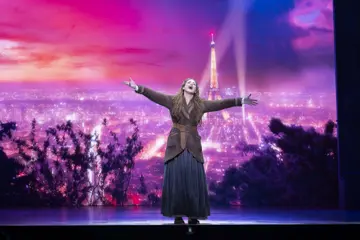the night before

In 2015, Michael Shannon’s already been the best thing in the maudlin marriage-equality weepie Freeheld and a fiery presence in the housing-bubble thriller 99 Homes, and, now, here he is, stealing every scene he’s in in The Night Before. “I’ve been told my quiet intensity has that effect on people,” he deadpans, gloriously, when it’s suggested he’s unnerving; Shannon effectively playing himself —one of the screen’s creepiest presences— in the middle of a Seth Rogen Christmas comedy.
Shannon plays an old high-school-teacher cum still-called-on drug-dealer, sorting out Rogen, Joseph Gordon Levitt, and Anthony Mackie as they seek to have one final Christmas Eve blowout before they submit to the blowoutlessness of adulthood. But Shannon’s also that most persistent Christmas-movie trope: the Dickensian device summoning visions of Christmas past, present, and future.
The Night Before —written by director Jonathan Levine, who last worked with Rogen and Levitt on the cancer-com 50/50— comes filled with references to Christmas movies past. Be they homage (the Home Alone scream), discussed aloud (hitting the light-up keyboard à la Big), or ironic meta-references; like Ilana Glazer’s turn as a self-styled ‘Grinch’, out to fuck with people’s Christmas cheer.
Don't miss a beat with our FREE daily newsletter
Like all Christmas films, there’s an essentially conservative heart to the story: the three friends have been like a family to each other, but, given how “it’s harder to stay friends with people when you’re older”, now they have to make peace with their real families, their changing lives, their imminent grown-up-ness. But, like all Rogen films, it ladles audacious, obnoxious, hedonistic comedy over top of its warm-and-fuzzies; the film filled with liberal drug use, copious smart-ass one-liners, and happy homoeroticism.
The most memorable sequence comes when Rogen —trying to balance ’shrooms with coke, results particularly disastrous— ends up mixing up phones with Mindy Kaling right after making a wigged-out video of pre-natal, new-parental terror (calling his unborn baby a “cunt” and having it be funny, no less). It initially seems like an eye-rolling sit-com set-up, but the premise pays-off when Rogen, baked off his brain, starts happily fielding incoming dick-pics from a dude named James.
It turns out to be Franco, of course; those old Freaks finding away to push bromantic dick obsession to a place of genuine bi-curiousness. The sweetness in the air when James meets Seth is more convincing than, say, the romance between Levitt and Lizzy Caplan. Not to mention Mackie’s turn as a steroid-abusing football star who recants on his chemical sins after Baron Davis laughs at him for performing a ‘white’ karaoke routine of Run-DMC’s Christmas Elf.
Coming from the Apatovian school of comedy, there’s not just bromance and dick jokes, but celebrity cameos. Miley Cyrus gets a whole extended sequence, and an in-on-the-joke performance; The Night Before using Wrecking Ball —with both smirking irony and singalong sincerity— in the same way The Interview employed Katy Perry’s Firework.
After that last Rogen/Franco rumpus ignited an international incident, it feels like a step-down to the low-stakes, here. But, in playing with —and mocking— the staples of the seasonal, Levine manages to have his cake and eat it too: for all he assaults the Christmas movie, its setting and sentiments guarantee a future of infinite end-of-year TV re-runs.
the end of the tour

James Ponsoldt’s The End Of The Tour is one of the greatest films about writing ever written. That’s because there’s no scenes of an inspired scribe clacking away at a typewriter, nor of a frustrated author filling a waste-paper basket with balled-up wads of rejected ideas. Instead, it’s a film about ideas and words, a conversation-piece that merrily dances through the self-aware, self-conscious, self-reflexive notions that defined the writing of the late David Foster Wallace.
It’s based on Although Of Course You End Up Becoming Yourself, David Lipsky’s quasi-chronicle of life on the road with Wallace; an annotated at-length interview with the then-ascendant writer after the release of his totemic opus, the 1000-page hyper-satirical po-mo doorstop Infinite Jest. Lipsky’s book came out after Wallace’s 2008 suicide ushered him into the canon of tortured geniuses.
The End Of The Tour is less a portrait of a tragic artist —out to either burnish or tarnish Wallace’s legacy— and more a study of what it means to take ideas, observations, opinions, and shape it into a narrative. Jason Segel plays Wallace as a kind of big, goofy hound, full of boundless energy and all too many ideas; the writer bristling with his transition, following the novel’s success, to subject of stories, rather than creator of.
As he and Jesse Eisenberg, playing Lipsky, bat back-and-forth ideas, and subtly wrestle for ‘control’ of the narrative, The End Of The Tour manages to be something remarkable: not just a buddy-movie roadtrip or parrying two-hander, but a story that taps into the human condition, existentialism, and perception; a film about how we perceive of ourselves and the world, and how we tell stories to convey that.
in the heart of the sea

If you like CGI water, does Rockin’ Ronnie Howard have a film for you! In The Heart Of The Sea is the ‘legend behind the legend’, the true —or, some would say, tall— tale that inspired Herman Melville to write Moby-Dick. Here, Ben Whishaw (Pingu!) plays Melville in a framing narrative, questioning old, drunken Brendan Gleeson about the tragic events of the Essex, the ship on which Gleeson sailed as a young scamp. Cue: Dissolve; and soon we’re flashing-back to heroic Chris Hemsworth, borrowing Mayor Quimby’s Masshole accent as a Nantucket whaler who fumes when he’s made first-mate beneath Benjamin Walker’s blue-blooded, unproven, ill-deserved captain.
From there, there’s macho rivalry, high-seas drama, storms, sailor talk; Howard never managing to transcend the feeling that this nautical adventure is taking place on a digital backlot. And, inevitably, there’s a whale, stalking our shipmen across horizon and ocean.
There can’t help but be some revisionist history in this tale; given whaling has taken quite a tumble in the court of public opinion since the early-19th-century. There’s still creatures slaughtered, flesh flensed, oil extracted, but when the film’s own white whale starts attacking the ships, Hemsworth becomes a voice of modernist reason, suggesting that mankind’s adversarial relationship with nature is something for which they’re being punished; death-by-whale so much poetic justice for so much hubris.
mississipi grind

Gambling movies are a normally-lamentable genre, but Anna Boden and Ryan Fleck show a deftness of touch with Mississippi Grind. Here Ben Mendelsohn and Ryan Reynolds are a pair of obsessive gamblers: Mendelsohn hapless, beaten-down, broken; Reynolds a player who skates by on a projected air of confidence, a player’s deft use of his charisma. In turn, the film makes use of the charisma of its leading men: Reynolds shaking off the stink of a run of bad career choices with a complex performance; Mendelsohn’s career renaissance showing no signs of slowing down.
Charismatic though these men are, Boden and Fleck know they’re also sad, lamentable figures; the obsessives who can’t say no. As with their breakout debut, Half Nelson, they’re charting addiction; the compulsions that can drag down even the most thoughtful, self-aware people. And as with Sugar, the duo’s underrated follow-up, Mississippi Grind is essentially a film about the dark-side of the American dream; about the sadness, melancholy, and failure that permeate even the most celebrated, glamourised myths of US success. Here, there’s no glittering Las Vegas castles or VIP high-roller tournaments, just two lost figures, haunting a desolate procession of bingo halls, dog tracks, and low-wattage casinos.
phoenix

Christian Petzold’s follow-up to his 2012 arthouse breakout, Barbara, finds the director continuing to do what he does: collaborating, again, with muse Nina Hoss on a highly-symbolic, insufferably-tense period drama. Here, Hoss plays a concentration camp survivor who, at the end of World War II, undergoes radical surgery to reconstruct her disfigured face, and is, in turn, mistaken as a doppelgänger for his ‘dead’ wife by her wayward, erstwhile, untrustworthy husband.
This theme of surgery and identity taps into some truly great films —Eyes Without A Face, Vertigo, The Skin I Live In— but there’s no homage, here, nor any notes of horror or tropes from thrillers. Instead, Hoss’s remade face becomes a symbol, Petzold’s parable connecting both personal and national post-war reconstruction. With utter command of his craft, he slowly builds towards a profound conclusion, its closing-shot the film’s crowning achievement.
an

Naomi Kawase’s ecstatic naturalism —in which shots of sun shining through leaves and branches blowing in the breeze seek to communicate a new-agey spirituality— has long played to plaudits at Cannes, but oft landed in an uneasy middle-ground too sentimental for cinephiles, but too abstruse for regular art-house play. With An, however, she turns populist: serving up a piping-hot crowdpleaser filled with freshly-baked red bean pastries and loving food-prep sequences.
At a hole-in-the-wall dorayaki stand, a broken-down baker, a gnarled old lady, and a lonely schoolgirl come together under the one roof; three little lost souls becoming three generations of an ad-hoc family. As the old dame’s bean paste becomes a local hit, their individual healing becomes a symbol of collective national healing; the Japanese social stigmas brought into —and then transcended by— the drama offering bona fide third-act catharsis.
















